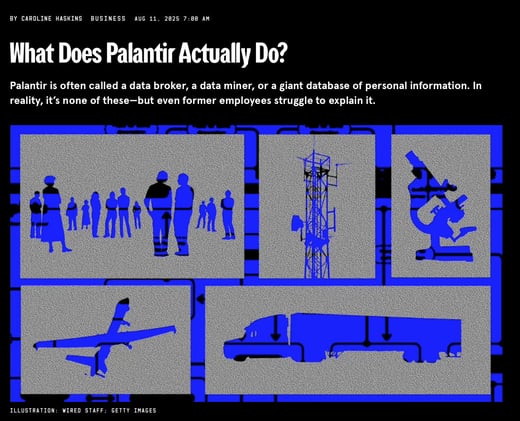- Pascal's Chatbot Q&As
- Archive
- Page 40
Archive
We swap out one “ultimate meaning” framework for another as soon as the old one can’t keep up with our changing reality. AI just happens to be the latest altar.
If we look at history with a long enough lens, humans do seem to reinvent—or at least repackage—their big belief systems roughly every few generations.

The realistic future is not AI replacing peer reviewers, but AI becoming an embedded infrastructure that handles the heavy lifting, while human reviewers focus on interpretation, originality, and...
...contextual judgment. Achieving this balance will require not just technology, but cultural change, policy enforcement, and continuous oversight.

Palantir first served U.S. intelligence, helping map insights that supported counter-terrorism efforts. Over time, it expanded into commercial sectors.
Critics point to its use by agencies like ICE, the Department of Defense, and foreign militaries—including Israel and Ukraine—for surveillance, deportation efforts, and military targeting.

The voracious appetite of AI companies for vast amounts of data to train their models, and the increasingly fortified walls that content creators are erecting to protect their digital assets.
The methods used to circumvent anti-scraping rules and dodge licensing fees are not just technical tricks; they are a reflection of a "move fast and break things" culture that is no longer tenable.

GPT-5: I agree, LLMs aren't on a trajectory toward AGI. They're powerful pattern recognizers, but their inability to truly learn, reason & adapt autonomously means they will never evolve into minds.
Treating hallucinations as edge-case bugs and believing scale alone will unlock cognition are indeed deep category errors. The danger is not in using LLMs, but in overpromising their trajectory.

Superficiality isn't a sign of intellectual failure but a core functional element. It's a strategic choice designed to bypass critical thought & appeal directly to emotion, tribal identity & fears.
Authoritarian discourse uses the forms of communication—speeches, media, rallies—to prevent genuine understanding and enforce compliance. It fundamentally inverts the purpose of communication.

The UK’s democracy can't afford to remain vulnerable to foreign financial influence masquerading as domestic support. What this investigation lays bare is not a rare lapse but a systemic vulnerability
If unchecked, this permissive environment will continue to allow overseas billionaires — some with questionable motives and legal histories — to shape British politics from behind a corporate veil.

Nanoplastics are not only present throughout the ocean but are also capable of penetrating biological systems at every level—from bacteria and plankton to fish and ultimately to humans.
The invisible plastic burden is no longer hypothetical. It is a present, urgent reality that demands international action—before this pollution leaves an irreversible legacy in our bodies & biosphere.

The July 2025 Cloudflare DMCA subpoena marks another escalation in the decades-long battle between academic publishers and shadow libraries.
The subpoena seeks to force Cloudflare to disclose identifying information about the operators of multiple domains associated with these shadow libraries, as well as several other websites.

The Superhuman blog post offers a compelling playbook for shifting enterprise AI initiatives from costly experiments to scalable profit drivers.
This review integrates Superhuman’s best ideas with global market trends, risk mitigation strategies, and leadership imperatives, making it more actionable for decision-makers.

The real imperative is not just building autonomous agents, but cultivating judicious, ethical, and goal-aligned systems that serve human ends...
...not merely corporate or technological momentum. The next step in AI evolution must be taken with clear eyes and full consent, not blind faith.

The Davis Vanguard’s warning about the dangers of ICE’s transformation into a massive, masked enforcement body under the Trump administration is not just a domestic civil rights alarm bell.
It is a geopolitical time bomb. The destabilizing effects could reverberate across borders, trigger refugee crises, and provoke conflicts that undermine regional security.












